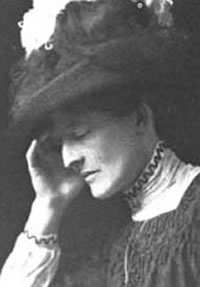 Born Magdalene Stuart Robison (1865-1953) in New South Wales, and later raised in Christchurch, New Zealand, Maud’s life changed when she married William Pember Reeves, a journalist and politician who no doubt sparked his wife’s interest in socialism and women’s suffrage. After marriage and motherhood, Maud’s choice to pursue a BA in French, mathematics, and English at Canterbury College was revolutionary. Though she cut her studies short to campaign for women’s suffrage (New Zealand granted women the right to vote in 1893), the fact that she would enter college after achieving the two things many in society believed a woman was placed on earth to fulfill is testament to a unique and independent woman (and a progressive husband).
Born Magdalene Stuart Robison (1865-1953) in New South Wales, and later raised in Christchurch, New Zealand, Maud’s life changed when she married William Pember Reeves, a journalist and politician who no doubt sparked his wife’s interest in socialism and women’s suffrage. After marriage and motherhood, Maud’s choice to pursue a BA in French, mathematics, and English at Canterbury College was revolutionary. Though she cut her studies short to campaign for women’s suffrage (New Zealand granted women the right to vote in 1893), the fact that she would enter college after achieving the two things many in society believed a woman was placed on earth to fulfill is testament to a unique and independent woman (and a progressive husband).
When in 1896, Reeves was transferred to London as Agent-General, the representative of New Zealand government within the British Empire, the couple became fast friends with such Fabian luminaries as the Webbs, George Bernard Shaw, and H. G. Wells. Maud was also active in England’s struggle for women’s suffrage, and in 1906 she was appointed to the executive of the NUWSS (National Union of Women’s Suffrage Societies), and two years later she helped establish the Fabian Women’s Group. Through this latter group, Maud initiated a study of the daily lives of working-class families in Lambeth, a southern London borough. According to Maud’s biographer,
“The Lambeth mothers’ project, initiated by Maud, was prompted by the recognition that more infants died in the London slums than in Kensington or Hampstead… Forty-two families were selected from a lying-in hospital in Lambeth, London, to have weekly visits, medical examinations from Dr Ethel Bentham every two weeks, and 5s. to be paid to the mother for extra nourishment for three months before the birth of the baby and for one year afterwards. The money came from private donations, and the mothers wrote down their weekly expenditure. Eight families withdrew because the husbands objected to this weekly scrutiny. Eight other mothers who could not read or write dictated their sums to their husbands or children.”
This study was packaged as a Fabian tract entitled Family Life on a Pound a Week in 1912, and when it was published for the public as Round About a Pound a Week, it caused a sensation. It “argued for government reforms, including child benefit, school dinners, and free health clinics. It also noted the role of poor housing conditions in child mortality, and how prenatal nutrition could help.” Beatrice Webb, amongst others, had been involved in the Royal Commission on the Poor Laws and Relief of Distress (1905-09), and this book provided concrete evidence that social reform was necessary and needed right away, thus paving the way for the Liberal Party’s revolutionary reforms of the late Edwardian period.
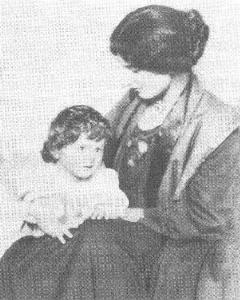 Maud’s daughter, Amber Reeves (1887-1981), followed in her mother’s footsteps, choosing to attend Cambridge rather than a court presentation, and founding the Cambridge University Fabian Society (CUFS) with Ben Keeling, which “was the first society at Cambridge to enlist women from its founding. Young women met regularly with men as equals and discussed everything from religious beliefs to social evils to sex, which would have been impossible in the conventional atmospheres of their homes.” In romantic life, Amber, however, did not follow her mother, instead taking the very married H. G. Wells as a lover and bearing him a daughter. She quickly married another man, and this illicit relationship inspired Wells’novel Ann Veronica, which scandalized society just as much as Elinor Glyn’s Three Weeks had two years before. Nevertheless, the Reeves women embodied not simply the evolving role for women in Victorian and Edwardian society, but the prototypes for the “New Woman” who strode boldly into the 20th century despite societal disapproval.
Maud’s daughter, Amber Reeves (1887-1981), followed in her mother’s footsteps, choosing to attend Cambridge rather than a court presentation, and founding the Cambridge University Fabian Society (CUFS) with Ben Keeling, which “was the first society at Cambridge to enlist women from its founding. Young women met regularly with men as equals and discussed everything from religious beliefs to social evils to sex, which would have been impossible in the conventional atmospheres of their homes.” In romantic life, Amber, however, did not follow her mother, instead taking the very married H. G. Wells as a lover and bearing him a daughter. She quickly married another man, and this illicit relationship inspired Wells’novel Ann Veronica, which scandalized society just as much as Elinor Glyn’s Three Weeks had two years before. Nevertheless, the Reeves women embodied not simply the evolving role for women in Victorian and Edwardian society, but the prototypes for the “New Woman” who strode boldly into the 20th century despite societal disapproval.
Further Reading:
Maud and Amber: a New Zealand Mother and Daughter and the Women’s Cause, 1865-1981 by Ruth Fry

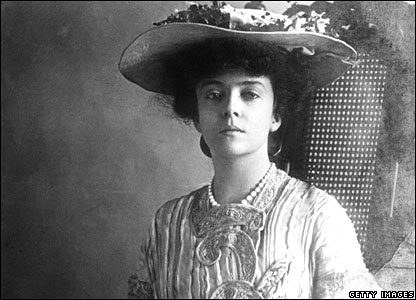
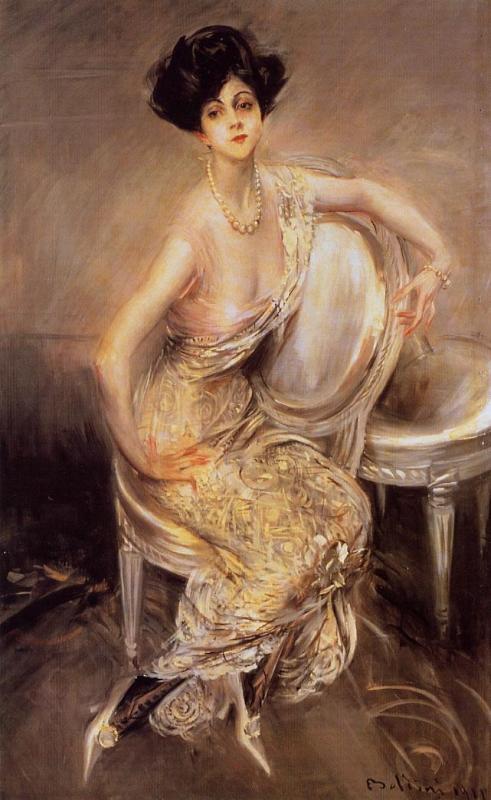
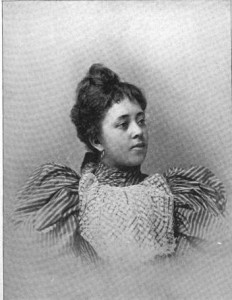

Hi! This site is so neat. Thanks for sharing your historical knowledge, and for this highlight of the suffrage movement. I have bookmarked!
Miss E
Thank you!